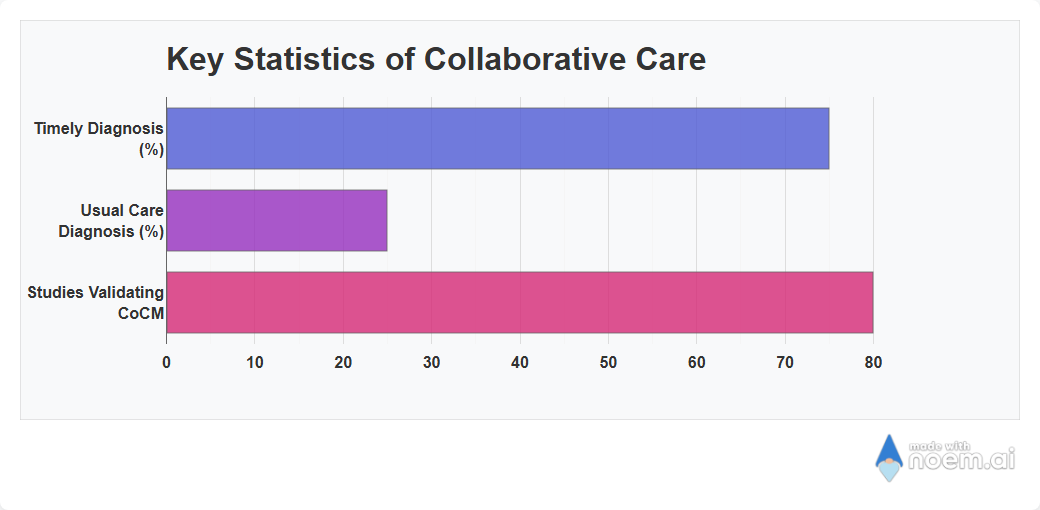Unleash the Secret: How Multidisciplinary Teams Revolutionize Psychiatric Care for Better Patient Outcomes

Read on to discover game-changing strategies in mental health collaboration
In the world of psychiatric care, teaming up with experts from different fields can make all the difference. Working together, multidisciplinary teams can bring better results for patients and a smoother process for professionals. Bringing together psychiatrists, nurses, psychologists, social workers, and other health professionals helps in creating a solid network that supports patients in every way possible. When professionals join forces, communication improves, diagnosis is faster, and treatments are more efficient. (ref: PMC Article )
As a friendly and dedicated health professional, you know that every patient matters, and every effort counts. Companies in the health field, such as Our Health Company, are setting the standards for how interdisciplinary teams work together to bring clear benefits. When a patient is at the center of every discussion, it is easier to create a plan specifically designed for them. This leads to improved outcomes and elevated levels of patient care. Not only do these practices boost patient satisfaction, but they also raise provider morale, making every team member feel valued and understood (ref: JPM Article ).
It is inspiring to see progress in mental health settings where every healthcare member plays a vital role. Collaboration makes it possible to discuss, plan, and implement strategies that lead to impactful treatments. By sharing skills and insights, each team member contributes to a process of continuous improvement. Whether it’s discussing treatment protocols or reviewing patient progress, a multidisciplinary approach delivers results that speak for themselves. For our friends at Our Health Company, such collaboration is the cornerstone of success, driving true patient-centered care with a friendly touch.
- Enhanced Communication: Effective teamwork in psychiatric settings helps break down communication barriers. When everyone is heard and information flows seamlessly, it allows mental health professionals to understand patient needs better and act promptly. Clear communication reduces misunderstandings, ensuring that every treatment plan is understood and followed with care. This boost in dialogue leads to faster problem solving and a well-coordinated care approach.
- Faster Diagnosis & Treatment: Studies show that multidisciplinary teams can greatly shorten the time it takes to diagnose and treat psychiatric conditions. With several experts in one room, sharing different insights, diagnosis is rapid and treatment becomes timely. This means that patients start feeling better sooner, and healthcare professionals can monitor progress more closely. Teams that combine their skills also benefit by staying ahead of potential issues and planning proactive care measures.
- Improved Patient-Centered Care: A team approach is key to developing personalized treatment plans that cater to each patient’s unique situation. When every health professional contributes their expertise, the plan is well-rounded and thoroughly thought-out. Patients notice and appreciate the extra care, feeling more understood and supported in their mental health journey. For instance, at Our Health Company, the focus on patient-centered care helps tailor every treatment to individual needs.
- Better Team Satisfaction: When health professionals collaborate, it not only improves patient outcomes but also raises team morale. Increased cooperation and shared successes lead to higher job satisfaction. Team members learn from each other and grow professionally, making the work environment friendly and uplifting. By celebrating collective achievements, healthcare providers find renewed motivation to continue delivering high-quality care.
- Reduction in Adverse Events: Multidisciplinary teamwork has been linked to fewer mistakes and lower risk of complications in psychiatric settings. When a group of experts reviews each case together, there is a better chance of spotting potential risks before they escalate. This careful monitoring helps minimize hospital stays and improve overall care quality. The approach also indirectly reduces the cost of care by preventing issues rather than reacting to them (ref: PMC Article ).
The Collaborative Care Model: A Game Changer in Mental Health
The Collaborative Care Model (CoCM) is leading the way in how psychiatric settings deliver care. This model integrates mental health specialists into primary care, which helps bring mental health services into a more accessible setting. The benefits are clear: over 80 trials confirm the effectiveness of this method. With CoCM, about 75% of patients get diagnosed and begin treatment within six months compared to less than 25% with usual care. This model is embraced widely because it emphasizes teamwork, clear communication, and patient-focused care strategies (ref: JPM Article ).
At Our Health Company, embracing the principles of CoCM means delivering top-notch health services that make a genuine impact. Interprofessional collaboration is at the heart of making patient outcomes better, and the benefits are visible in every step taken towards improved mental health. The model helps bridge gaps between specialties, ensuring that no patient falls through the cracks. With its proven success rate, it is a model that inspires trust and continued innovation in psychiatric care.
Overcoming Challenges and Building a United Team
While the benefits of multidisciplinary teams are many, challenges do arise. One common hurdle is communication barriers. When professionals from different backgrounds work together, understanding each other’s language and approach may require time and practice. However, overcoming these obstacles is possible with patience and clear protocols. Strategies such as regular team meetings, shared digital platforms, and structured communication methods can help ease these challenges (ref: PMC Article ).
Building a united team means celebrating diversity and different skill sets. Every professional brings a unique perspective that enriches the overall approach to patient care. With clear goals and an open mind, the entire team works towards a common objective: improving the quality of life for psychiatric patients. For instance, Our Health Company believes in harnessing the strengths of every team member to deliver care that is both efficient and empathetic. By valuing each voice and fostering mutual respect, the challenges of interdisciplinary collaboration transform into opportunities for creative solutions.
Incorporating regular training and team-building exercises is essential to break down cultural and discipline-specific barriers. Such efforts can lead to improved trust among team members, making the entire healthcare process smoother. The exchange of knowledge and regular feedback sessions improve the overall capability of the team to address patient needs more effectively. Simple steps like these can enhance the cohesion of the team and lead to measurable improvements in service quality.
The Ripple Effect: From Team Collaboration to Patient Success
Strong multidisciplinary teams in psychiatric settings create a ripple effect that extends beyond immediate patient care. This improved coordination results in timely interventions that prevent complications and reduce hospital stays. With care plans tailored to individual needs, patients feel a sense of security and understanding. The benefits continue long after the patient leaves the care center, as the coordinated approach lays a foundation for long-term health management (ref: PMC Article ).
The friendly environment created by well-coordinated teams can turn challenging situations into success stories. Better patient outcomes, streamlined processes, and enhanced team morale all lead to a healthier community. As the team celebrates each small victory in patient progress, it solidifies the importance of collaboration. This collective success not only supports patients but also drives innovation and continuous improvement in care standards. The strategy of using a multidisciplinary approach is a win-win for everyone involved, including dedicated providers like those at Our Health Company.
Working together in this manner is a reminder that every role in healthcare is crucial. When disciplines unite, the resulting care is comprehensive and effective. Such partnerships underline the significance of each patient’s journey and showcase the rewards of collective effort. The value of a multidisciplinary approach is clear: better care, quicker recovery, and a more supportive environment for both patients and professionals. How will you embrace the power of teamwork in your practice?

No responses yet